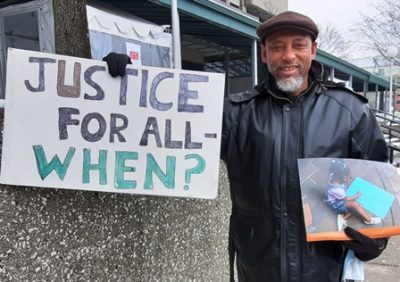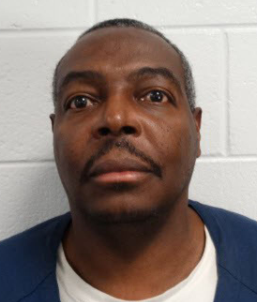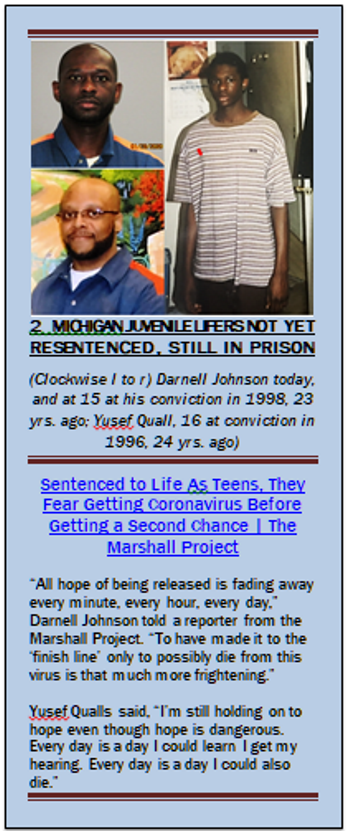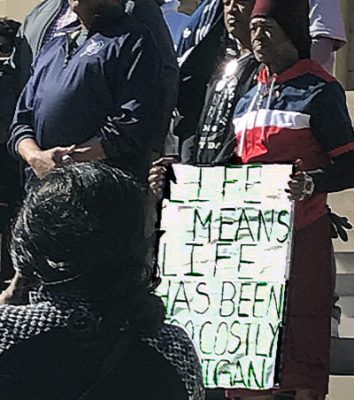Nine years after U.S. Supreme Court first banned mandatory juvenile life without parole, 43% of Michigan juvenile lifers have not been re-sentenced.
“Now you’re in a position where what was a presumptively unconstitutional life sentence runs the risk of becoming a categorically unconstitutional death sentence.” — Eli Savit, Washtenaw County Prosecutor
Nationally, Michigan has highest number of juvenile lifers still in prison
Other lifers and wrongfully convicted individuals also face virtual death sentences
COVID-19 death count in MDOC skyrocketing, now at 135
By Diane Bukowski, VOD Editor and Ricardo Ferrell, Field Editor
February 9, 2021
Sign Petition for COVID-19 Vaccines for Prisoners
https://www.change.org/COVID-19VaccinesforMichiganPrisoners
Petition · The Injustice Must End: Support Michigan Prison Reform · Change.org

Edward Sanders at rally for juvenile lifers on steps of Frank Murphy Hall in downtown Detroit Jan. 25, 2021.
DETROIT—Former juvenile lifers and their supporters gathered outside the Wayne County Third District Courthouse Jan. 25 to call for the release of 150 others sentenced to juvenile life without parole (JLWOP), who still languish in Michigan’s prisons.
They said the state’s failure to re-sentence them, nine years after the U.S. Supreme Court first banned JLWOP, now subjects them to possible death sentences as COVID-19 rages through Michigan Department of Corrections (MDOC) prisons. To date, 137 prisoners have died due to the coronavirus.
The Supreme Court ruled that mandatory juvenile life without parole sentences for those under 18 years old are unconstitutional, “cruel and unusual punishment,” and should be handed down only in the “rarest” cases of “irreparably corrupt” defendants, in Miller v. Alabama (2012) and Montgomery v. Louisiana (2016), which made Miller retroactive.

William Garrison/MDOC
“At time of the Supreme Court decisions, over 2,500 children were serving life without parole nationally,” said Edward Sanders, a juvenile lifer released in 2017. “Since then, only 700 have been released. At least 12 have died in custody. . . We don’t agree with putting children in cages. We don’t agree with ignoring the USSC decision.”
Sanders pointed out the death of William Garrison of Detroit in Macomb Correctional Facility on April 18, 2020. Garrison went to prison at the age of 16 in 1976, convicted of a murder during a robbery that went awry. A judge ordered his release after re-sentencing in March 2020, but he died of COVID-19 as he waited for Wayne County Prosecutor Kym Worthy’s office to register its formal approval of his release.

Washtenaw Co. Prosecutor Eli Savit
“Now you’re in a position where what was a presumptively unconstitutional life sentence runs the risk of becoming a categorically unconstitutional death sentence,” Washtenaw County Prosecutor Eli Savit told WXYZ Channel 7 News in an interview Jan. 11. “The sentence that was bestowed on juvenile lifers did not include catching COVID, it did not include death, but that is the situation that we’re in right now.”
Savit is newly-elected, after running on a campaign devoted to remedying mass incarceration and other defects in the criminal justice system.
Nationally, Michigan has the highest number of juvenile lifers still in prison, and had the second highest number of juvenile lifers among the states at the time of the U.S. Supreme Court rulings. Since then, many states have completely outlawed JLWOP.
The U.S. is the ONLY country in the world that sentences children to life in prison, a/k/a death by incarceration. It is also Cthe only country in the world that implements “natural-life” sentences. Most other countries allow such lifers to see parole boards after 15 years.
In Wayne County, approximately 51 out of an original 144 juvenile lifers, the highest number among Michigan counties, remain to be resentenced, according to the State Appellate Defenders’ Office and the Michigan American Civil Liberties Union.
 However, an undetermined number of those listed as resentenced, both in Michigan and in Wayne County, are still in prison because the state legislature mandated that anyone being resentenced must serve a minimum term of 25 years. (See box at left.)
However, an undetermined number of those listed as resentenced, both in Michigan and in Wayne County, are still in prison because the state legislature mandated that anyone being resentenced must serve a minimum term of 25 years. (See box at left.)
The state of Michigan fought the USSC 2012 ruling for four years until the Court declared it retroactive in 2016. Then, the state’s county prosecutors recommended that 60 percent of Michigan’s juvenile lifers be recommended for renewed LWOP, further delaying compliance with the USSC rulings.
Michigan juvenile lifer and prison activist Efrén Paredes, Jr. of Benton Harbor spoke at the 18th Annual Dr. Martin Luther King Day celebration held virtually in Detroit Jan. 15.
Paredes was 15 when he was convicted in 1989 in Berrien County, where the court system is run by the majority-white residents of St. Joseph. He contracted COVID-19 in December 2020, and is awaiting the results of a re-sentencing hearing held Jan. 15.
“Michigan Attorney General Dana Nessel can intervene in this situation by having her office take over the remaining juvenile lifer cases,” Paredes said. “She can then withdraw the motions seeking JLWOP sentences against the remaining juvenile lifers and allow them to receive term of years sentences.”
Paredes has a Facebook page at (20+) Free Efrén Paredes, Jr. | Facebook. Also See http://voiceofdetroit.net/wp-content/uploads/COURT-HEARING-HELD-IN-EFREN-PAREDES-JR-CASE2.pdf. He and his supporters are campaigning for a 10-Pt. Prison Reform program at bitly.com/michpr.
Governor Gretchen Whitmer and MDOC Director Heidi Washington have said they are releasing as many “parole-eligible” prisoners as possible to ease overcrowding, in an attempt to comply with COVID-19 social-distancing guidelines. They reported that 5,000 “parole-eligible” prisoners had been released as of December.
WXYZ Channel 7 News reported last December that MDOC spokesman Chris Gautz said that half of the 108 prisoners who had died from COVID-19 at that point were serving life sentences and wouldn’t have been released anyway. That remark that has been hotly contested by many prisoners and their loved ones, as callous and grossly inaccurate.
Juvenile lifers are not included in the “parole-eligible” category although most will eventually be resentenced to terms of years. The Michigan ACLU settled a 20-year lawsuit against the state of Michigan last September, Hill v. Whitmer, which sets time limits for the re-sentencings of the 150 juvenile lifers still incarcerated.
“. . . the settlement allows prosecutors 90 days to complete a new review of class members who haven’t been resentenced, and provides a 60-120 day time limit for how long prosecutors have to prepare their case for court,” Michigan Radio reported. “The settlement also makes those still awaiting resentencing eligible for rehabilitation programming in prison – something parole boards often consider when deciding whether an individual should be released.” See: Settlement reached for Michigan’s juvenile lifers, schedules “prompt” resentencings | Michigan Radio
The settlement agreement, which includes the names of the individual prisoners, is at: http://voiceofdetroit.net/wp-content/uploads/Hill-v-Whitmer-settlement-agreement-9-28-2020.pdf.

Parolable lifers who challenged “life means life” policy in ultimately successful lawsuit. Foster-Bey passed
Also excluded from consideration for immediate release due to the coronavirus are prisoners serving “parolable” life sentences, for crimes such as second-degree murder. Before the reign of former Michigan Gov. John Engler in the 1990’s, parolable lifers were eligible for parole at 10-15 years into their sentences. Since then, their numbers have skyrocketed because Engler’s appointed parole board chief Stephen Marschke declared that “life means life.” A class-action lawsuit filed by the plaintiffs above, Foster-Bey v. Rubitschun, eventually resulted in a ruling loosening the Engler-era strictures. Parolable lifers still see the parole board every five years and many are eventually released.

The late Kenneth Foster-Bey at Safe and Just Michigan rally for lifers after his release. Foster-Bey spent his time after release fighting for others he left behind. He passed in 2020.
Many governors have also commuted the sentences of those serving life without parole. In 2018, Gov. Rick Snyder commuted the sentences of 25 lifers, and pardoned 36 others, a total of 61. Former Gov. Jennifer Granholm commuted over 100 lifers’ terms. Governors William Milliken, James Blanchard, and John Engler also exercised this executive power at the end of their terms in office.
Private investigator Scott Lewis, who specializes in wrongful conviction cases, told VOD last year that he estimates at least 30 percent of MDOC prisoners are actually innocent. In the past several years, the Wayne County Prosecutor’s office has exonerated or released 24 prisoners, most serving life terms, due to actual innocence or unfair trials. Many of those released say there are “100’s” of other innocent prisoners still incarcerated in the MDOC.
What allows many to endure prison conditions and the COVID-19 pandemic is the fact that they continue to fight their convictions in court appeals at state and federal levels.
#FreeMichiganJuvenileLifersNow, #EndDeathbyIncarceration, #StopCOVID19Execution, #VaccinesforallMichiganPrisonersNow, #EndSchooltoPrisonPipeline
A formatted PDF of this story can be printed at http://voiceofdetroit.net/wp-content/uploads/150-MICHIGAN-JUVENILE-LIFERS-FACE-POSSIBLE-DEATH-FROM-COVID-VOD.pdf
********************************************************************************
 Voice of Detroit is a pro bono newspaper. VOD’s editors and reporters, most of whom live on fixed incomes or are incarcerated, are not paid for their work. Ongoing costs include quarterly web charges of $380, P.O. box fee of $150/yr. and costs for research including court records, and internet fees, as well as office supplies, gas, etc. Please, if you can:
Voice of Detroit is a pro bono newspaper. VOD’s editors and reporters, most of whom live on fixed incomes or are incarcerated, are not paid for their work. Ongoing costs include quarterly web charges of $380, P.O. box fee of $150/yr. and costs for research including court records, and internet fees, as well as office supplies, gas, etc. Please, if you can:
DONATE TO VOD at
https://www.gofundme.com/donate-to-vod
*********************************************************************************
Related stories:




